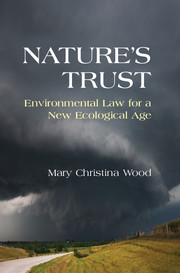Book contents
- Frontmatter
- Dedication
- Contents
- Preface
- Acknowledgments
- Part I Environmental Law: Hospice for a Dying Planet
- Part II The People’s Natural Trust
- 6 The Inalienable Attribute of Sovereignty
- 7 The Ecological Res
- 8 Fiduciary Standards of Protection and Restoration
- 9 From Bureaucrats to Trustees
- 10 Beyond Borders: Shared Ecology and the Duties of Sovereign Co-Tenant Trustees
- 11 Nature’s Justice: The Role of the Courts
- Part III The Public Trust and the Great Transition
- Notes
- Index
6 - The Inalienable Attribute of Sovereignty
Published online by Cambridge University Press: 05 June 2014
- Frontmatter
- Dedication
- Contents
- Preface
- Acknowledgments
- Part I Environmental Law: Hospice for a Dying Planet
- Part II The People’s Natural Trust
- 6 The Inalienable Attribute of Sovereignty
- 7 The Ecological Res
- 8 Fiduciary Standards of Protection and Restoration
- 9 From Bureaucrats to Trustees
- 10 Beyond Borders: Shared Ecology and the Duties of Sovereign Co-Tenant Trustees
- 11 Nature’s Justice: The Role of the Courts
- Part III The Public Trust and the Great Transition
- Notes
- Index
Summary
Nature’s Trust presents the antithesis of the discretion model that has bred corruption and cover-up in many environmental agencies. It draws from the ancient yet enduring public trust principle, which safeguards crucial natural resources as common property of all citizens. The doctrine holds government, as trustee of ecological assets, to a quintessential duty of protection. As the Supreme Court emphasized in Geer v. Connecticut: “[I]t is the duty of the legislature to enact such laws as will best preserve the subject of the trust, and secure its beneficial use in the future to the people of the state.”
Infused with expectations of democracy, Nature’s Trust repositions all players in their relationship to ecology. It conceives of government officials as public trustees rather than as arbitrary political actors, and it bears no tolerance toward disloyal public servants. It presents Nature as the trust res, a priceless endowment comprised of tangible and quantifiable assets, instead of a vague “environment” with amorphous value. The citizens stand as beneficiaries holding a clear public property interest in these natural resources, rather than as weakened political constituents with increasingly desperate environmental appeals to bring to their public officials. The approach views polluters as marauders of trust assets rather than as “stakeholders” controlling the political sphere. As Professor Joseph Sax observed more than four decades ago, the public trust demarcates a society of “citizens rather than of serfs.” At this point in history when ecology comes under siege by large corporations and government acts as their accomplice in irrevocable resource loss, the trust demands massive rebuilding and restitution of the people’s rightful natural wealth.
- Type
- Chapter
- Information
- Nature's TrustEnvironmental Law for a New Ecological Age, pp. 125 - 142Publisher: Cambridge University PressPrint publication year: 2013



